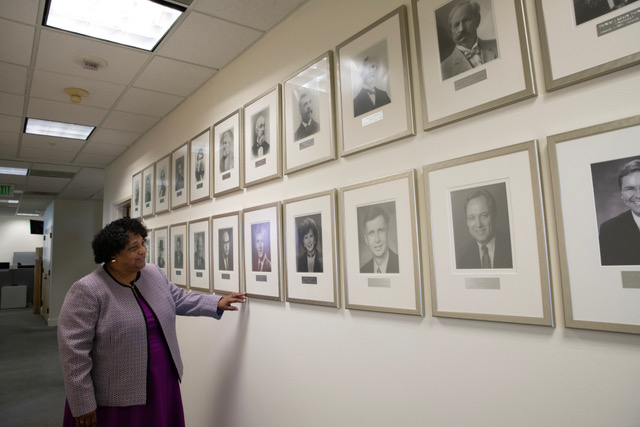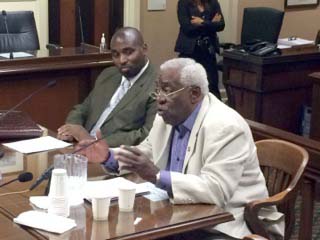
By Simeon Gant/ California Black Media
| Aubry Stone, president and CEO of the California Black Chamber of Commerce, right, addresses legislators as Malaki Seku-Amen, president of the California Urban Partnership, left, looks on. |
Recognizing the perpetual struggle for Black-owned businesses to survive in California, the Legislative Black Caucus convened an informational hearing with two Assembly business and jobs committees at the State Capitol recently to hear testimonies of established business owners and what it will take to improve their enterprises.
“We need access to Capital,” expressed Aubry Stone, president and CEO of the California Black Chamber of Commerce.
“Black-owned businesses are less than two percent of firms doing business with the biggest state agencies such as DGS, Cal Trans, High Speed Rail, Department of Corrections, Cal PERS or the Department of Education,” he added.
Each business owner classifying themselves as Black or African American, echoed similar frustration of limited access to money afforded at greater levels to other ethnicities.
The hearing sought to address all African American owned businesses on every level of the spectrum of American enterprises. The Black Caucus sought to be comprehensive, inviting Bonnie James, President & CEO, BRJ & Associates, LLC; Reginald Webb, McDonalds Franchisee; Michael Lacy, Fatburger Franchisee; and Edward Barnett, Buffalo Wild Wings Franchisee.
The concerns sought to also vet solutions for construction management companies, new car dealers, barber shop owners, restaurant owners, publishers, energy service companies and any legitimate business enterprise registered with the state, local and federal guidelines.
Since the 1996 enactment of Proposition 209 — the landmark amendment prohibiting state institutions from racial preferences in the areas of public employment, public contracting and public education — Black-owned business owners believe there is a deliberate exclusion to the network of state agencies and preferred businesses winning multi-million dollar projects. In contrast, the federal government continues to allow U.S. Departments to employ preference guidelines for ethnically diverse businesses.
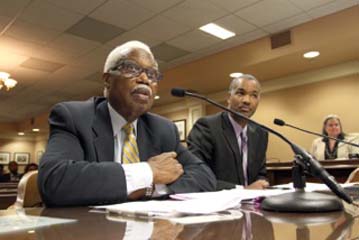 |
| Pasadena’s Dr. Bonnie James of BRJ & Associates shares the difficulties of getting a state contract as Larry Lee, president and general manager of The Sacramento Observer, right, looks on. |
Larry Lee, president and General Manager of the Sacramento OBSERVER Newspaper, told the committee his newspaper reported a distinct drop in the number of Black-owned businesses in California after Prop. 209. Lee is also the Sacramento Black Chamber of Commerce’s chairman of the board.
“I feel I can confidently say that many of California’s Black business owners feel like the state has turned its back on them. And for a state as diverse and wonderful as California, that is a great tragedy,” he said.
“The failings of the state to stand up for and support African American businesses has had a ripple effect on the African American community at large,” Lee added.
Stone stressed with the legislative leaders the need for amending Prop. 209, simply saying, “It’s got to go.” Stone said since the state is prohibited from racial preferences, one of the challenges that impedes the growth of California’s Black businesses is the inability to collect data on those businesses.
Stone said that most of the information leaders have on Black-owned businesses comes from the Small Business Administration or the U.S. Census, which have some inaccuracies. Stone cited that according to the SBA, there are about 130,000 Black-owned businesses in California. By comparison, there are about 1.1 million women-owned businesses in California.
The hearing also often pointed to a lack of employment resources for small, Black-owned businesses. Stone said that the Black-owned business in California average 1.7 employees. In reference to applying for such large contracts and implementation he said, “The challenge is the businesses are too small.”
Public notice of contracts, or the lack thereof, is one of many barriers to Black-owned businesses. In 2012, Governor Jerry Brown released a manual for state contracts. The guidelines state the departments must publicize the contracting opportunity, “usually by formal advertising,” “must be available to all competitors,” “competition must not be unnecessarily restricted,” and “Procedures must be followed to ensure a fair competition.”
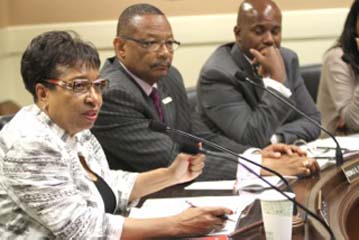 |
| Assembly leaders Cheryl Brown, left, makes a point while California Legislative Black Caucus chair Reginald Jones-Sawyer, center, and Mike Gipson, right listen. |
Ethnic media outlets consistently protest about receiving notices for large contracts with fewer than 60 days, often less than 30 days notice. Unable to share the information with their readers, they fear the contractors on the list are given the notice well in advance to prepare for the contract application — a clear unfair advantage and barrier to obtaining precious capital.
Malaki Seku-Amen, a California state government consultant and president of the California Urban Partnership, resolves legislation, currently making its way through the state Senate and Assembly, would reward large companies and private investors with a “New Markets” tax credit when they support small, minority-owned businesses within impoverished communities, by investing substantial cash toward needy, yet worthy business enterprises.
AB 185 specifically states, “The purpose of this program is to stimulate private sector investment in lower income communities by providing a tax incentive to community and economic development entities that can be leveraged by the entity to attract private sector investment that in turn will be deployed by providing financing and technical assistance to small and medium sized businesses and the development of commercial, industrial, and community development projects, including, but not limited to, facilities for nonprofit service organizations , light manufacturing, and mixed-use and transit-oriented development.”
Seku-Amen also suggests potential entrepreneurs should receive more assistance from California by matching the federal government’s commitment to providing aid toward business startups, technical assistance and guidance through the mélange of regulations, certifications, bonding, security, insurance, permits, licensing and accounting practices.
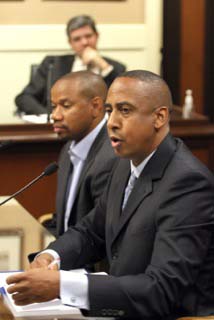 |
| Former Fatburger franchise owner Michael Lacy, right, shares the difficulties he faced as Buffalo Wild Wings franchise owner Edward Barnett, left, listens. |
“The California Competes Tax Credit should be used in ways that are fair and equitable,” he stated, referring to a tax credit that helps small businesses make capital purchases for major equipment, to relocate to California and hire ex-offenders. “But there’s no incentive to large investors to deploy the $500 billion of private capital assets to small businesses in low income communities. AB 185 does that. If enacted Black businesses in California could reduce the 60 percent teenage unemployment rate.”
There was scant mention of raising the minimum wage in California, but Seku-Amen strongly advises against it, noting, “It hurts Black Businesses and could be fatal.”
Assemblymember Cheryl Brown, a democrat from San Bernardino and business owner for four decades, chairs the Black Caucus committee on Black Enterprise. She conveyed the purpose of the hearing was to improve the condition of Black businesses in California and “shed light on their status as an economic engine in this state.”
“It takes a certain mind-set to run a business and be able to sign a check on both sides,” she said.
Assemblymember Brown assured this was the first of more hearings to vet legislative solutions to reverse slumping Black-owned businesses. She is challenging the Black Caucus to take notice of Black-owned businesses and the connection to overall economic prosperity in the collective Black community.
###
FAST FACTS ABOUT BLACK-OWNED BUSINESS
(Source: U.S. Census Bureau)
- In 2007, Blacks owned 1.9 million nonfarm U.S. businesses operating in the fifty states and the District of Columbia, an increase of 60.5 percent from 2002.
- These Black-owned firms accounted for 7.1 percent of all nonfarm businesses in the United States, employed 921,032 persons (0.8 percent of total employment) and generated $137.5 billion in receipts (0.5 percent of all receipts).
- Among U.S. counties, Cook County, Illinois, had the largest number of Black-owned firms in 2007 at 83,733. Los Angeles County, California had the second largest number of Black-owned firms, with 59,680. Kings County, New York, was third, with 52,705 Black-owned firms.
- In 2007, there were 106,824 Black-owned employer firms, an increase of 13.0 percent from 2002. These firms employed 921,032 person and had a total payroll of $23.9 billion, an increase of 22.2 percent and 36.3 percent respectively from 2002.
- These firms generated $98.9 billion in receipts, an increase of 50.2 percent from 2002.
- In 2007, employer firms accounted for 5.6 percent of the total number of Black-owned firms and 71.9 percent of Black-owned firms’ gross receipts. Average receipts for these Black-owned employer firms in 2007 were $925,427.
- In 2007, 1.8 million Black-owned firms had no paid employees, an increase of 64.5 percent from 2002.
- These nonemployer firms generated $38.6 billion in receipts, an increase of 69.0 percent from 2002.
- In 2007, nonemployers accounted for 94.4 percent of the total number of Black-owned firms and 28.1 percent of gross receipts. Average receipts for these Black-owned nonemployer firms in 2007 were $21,263.
Employer businesses are firms with paid employees, including workers on the payroll and excluding sole proprietors and partners. Nonemployer businesses are firms without paid employees, including sole proprietors and partners of unincorporated businesses that do not have any other employees on the payroll.


